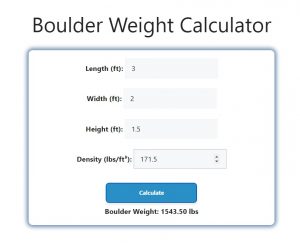About Boulder Weight Calculator (Formula)
The Boulder Weight Calculator is a useful tool for architects, landscapers, and construction professionals who need to estimate the weight of boulders for various projects. Knowing the weight of a boulder is crucial for planning transport, ensuring structural integrity, and determining the necessary equipment for lifting and moving. This article will explain the formula used for calculating boulder weight, provide instructions on how to use the calculator, and address common questions related to boulder weight.
Formula
The formula for calculating boulder weight is: Wb = L * W * H * d, where Wb represents the weight of the boulder, L is the length, W is the width, H is the height, and d is the density of the material.
How to Use
To use the Boulder Weight Calculator effectively, follow these steps:
- Measure the Dimensions: Measure the length, width, and height of the boulder in consistent units (inches, feet, or meters).
- Determine the Density: Identify the density of the material the boulder is made of. Common densities include:
- Granite: 2.75 g/cm³
- Limestone: 2.65 g/cm³
- Sandstone: 2.40 g/cm³
- Input Values: Enter the length, width, height, and density into the calculator.
- Calculate Weight: Use the formula Wb = L * W * H * d to compute the weight of the boulder.
Example
Suppose you have a boulder with the following measurements:
- Length (L): 3 feet
- Width (W): 2 feet
- Height (H): 1.5 feet
- Density (d): 2.75 g/cm³ (which is equivalent to approximately 171.5 lb/ft³ for this calculation)
- Convert Density: Since we are using feet for measurements, convert the density of granite:
Density (d) = 171.5 lb/ft³ - Apply the Formula:
Wb = L * W * H * d
Wb = 3 ft * 2 ft * 1.5 ft * 171.5 lb/ft³ - Calculate:
Wb = 3 * 2 * 1.5 * 171.5
Wb = 1539.75 lbs
Thus, the weight of the boulder is approximately 1539.75 pounds.

FAQs
- What is the Boulder Weight Calculator?
The Boulder Weight Calculator estimates the weight of a boulder based on its dimensions and material density. - Why is knowing boulder weight important?
Knowing the weight helps in planning transport, selecting equipment, and ensuring structural integrity in projects. - What units can I use for measurements?
You can use any consistent unit for length, width, and height, but ensure the density is converted accordingly. - How do I find the density of a material?
Density values can be found in material property databases or engineering references. - Can this calculator be used for irregularly shaped boulders?
While primarily designed for regular shapes, you can approximate the dimensions of irregular boulders for a rough estimate. - What is the density of common boulder materials?
Common densities include granite (2.75 g/cm³), limestone (2.65 g/cm³), and sandstone (2.40 g/cm³). - How does moisture content affect boulder weight?
Moisture can increase the weight of a boulder, as water adds to its overall mass. - What if I don’t have the exact dimensions?
Use estimated measurements based on the closest dimensions available for a rough calculation. - Is the calculator suitable for both small and large boulders?
Yes, the calculator is applicable for boulders of any size as long as accurate dimensions and density are provided. - Can I use this calculator for other shapes?
While it is designed for boulders, similar calculations can be adapted for other geometrical shapes with appropriate formulas. - What tools can I use to measure boulder dimensions?
A tape measure or laser distance measurer can provide accurate dimensions. - How do I convert density units if needed?
Use conversion factors to switch between units, for example, from g/cm³ to lb/ft³. - What is the importance of density in this calculation?
Density directly influences the weight calculation, as it reflects how much mass is contained within a specific volume. - Can I use this calculator for landscaping projects?
Yes, it is particularly useful for landscaping, construction, and architectural projects where boulders are used. - Is there a way to reduce boulder weight?
While you can’t change the weight of a boulder, you can select lighter materials for your projects if weight is a concern. - How often should I reassess my boulder weight calculations?
Reassess calculations if there are changes in project scope, material selection, or boulder size. - Can this calculator help with transportation planning?
Yes, knowing the boulder weight aids in planning the right transportation and lifting equipment. - What safety measures should I consider when moving boulders?
Always use proper lifting equipment and techniques, and consider the weight limits of your machinery. - What are some applications for knowing boulder weight?
Applications include landscaping design, construction projects, and geological studies. - How precise does the measurement need to be?
While high precision is ideal, estimates are acceptable for general calculations as long as they are reasonably accurate.
Conclusion
The Boulder Weight Calculator is an essential tool for anyone involved in construction, landscaping, or any project requiring the use of boulders. By understanding how to calculate the weight of boulders based on their dimensions and material density, you can make informed decisions that ensure safety and efficiency in your projects. Whether you’re planning a large landscaping installation or determining the load capacity for transportation, this calculator provides a straightforward solution for assessing boulder weight accurately.